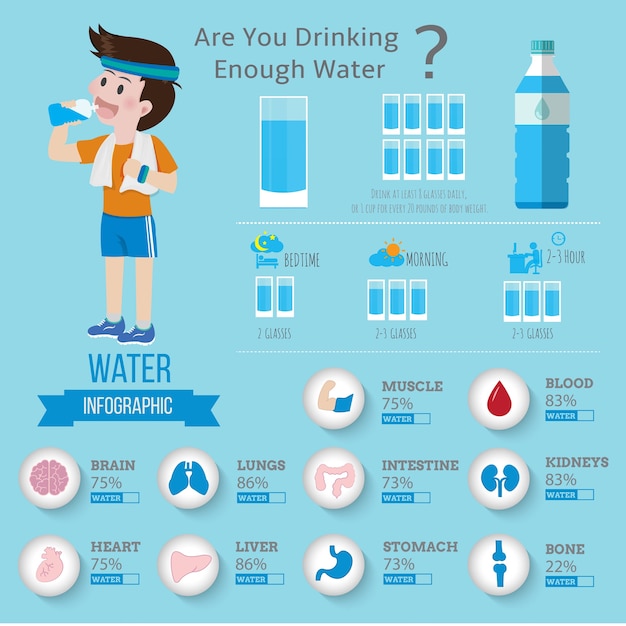
It’s crucial to keep our bodies properly hydrated. With many other beverages available like coffee, soda, and sports drinks, you might forget to drink just plain water. Some may argue there’s enough water in these other drinks, and if they aren’t thirsty, it’s not a problem. However, that’s not true. If you’re feeling thirsty, it means you’re already dehydrated!
So, how much water should you drink daily? It’s not as simple as eight glasses a day. Multiple factors determine this, including:
– Your location: If you live in a hot, humid, or dry area, you’ll need more water than in a cooler climate or at high altitudes.
– Your diet: If you eat lots of salty, sugary, or spicy food, you’ll need more water. But if you eat foods rich in water like watermelon or spinach, you’ll be less thirsty.
– The time of year and weather: You’ll need more water in the summer when it’s hot, and less in colder weather.
– Your surroundings: If you are often outdoors in hot weather or in heated rooms, you’ll feel thirstier.
– Your activity level: If you exercise regularly or your job is physically demanding, you’ll need more water to replace the fluid lost through sweating.
– Your health: Health conditions may affect your hydration. Conditions like fever, diarrhea, vomiting, diabetes, and bladder infections can increase your fluid needs.
– If you’re pregnant or breastfeeding: You need more water to hydrate both you and your baby. Breast milk is 90% water, so nursing mothers should drink more.
Your daily water needs revolve around how much water your body uses and loses. Generally, a resting adult maintains water levels within 0.2% of their body weight per day. It isn’t easy to precisely calculate this, but on average, men need about 3.7 liters of fluids per day and women need 2.7 liters (including water, food, and other drinks).
How can you tell if you’re drinking enough? Mostly, if you’re not regularly thirsty and your urine is light or clear, you’re probably doing fine. If you have lost 3% or more of your body weight due to fluid loss, that’s a sign of dehydration, which can be severe.
To avoid dehydration, focus on drinking water regularly, keep a water bottle handy when you’re outside, drink around meals and exercise times, and of course, drink when you’re thirsty.
Can you drink too much? While it’s rare, overhydration can happen, especially in athletes or people who drink a lot while exercising intensely. This condition, called water intoxication, can cause nausea, headaches, vomiting, and in severe cases, increased blood pressure, confusion, and difficulty breathing.
In conclusion, there’s no one-size-fits-all answer for how much water to drink. It varies by individual and situation. But one universal fact remains: staying hydrated is key to a healthy body! So, keep sipping! Drink responsibly, but frequently.


